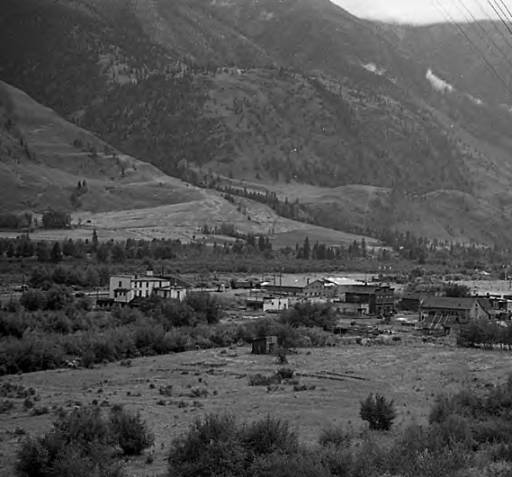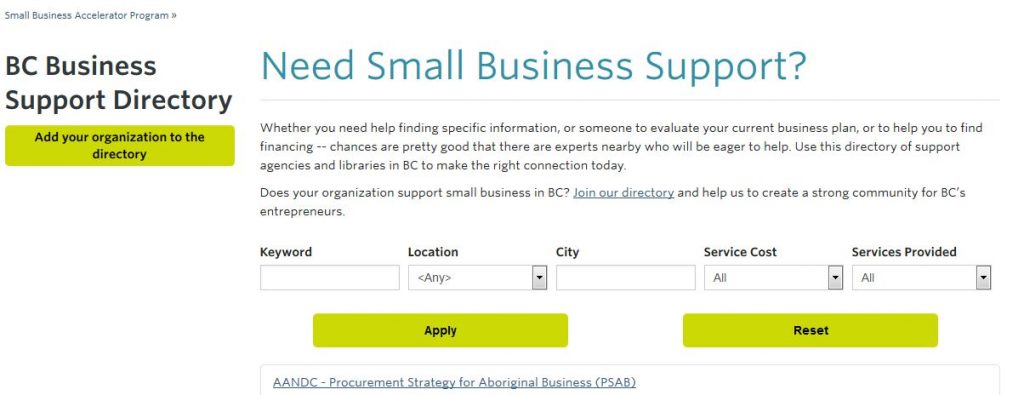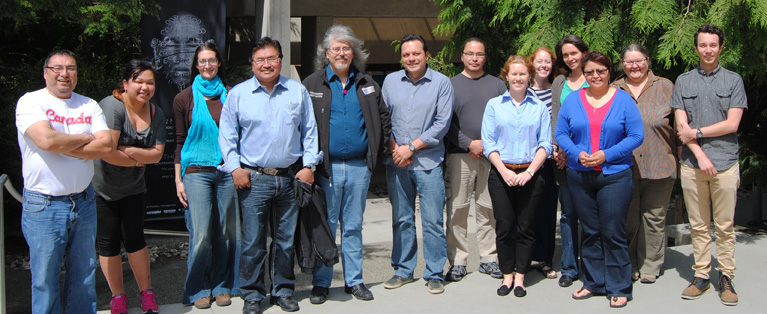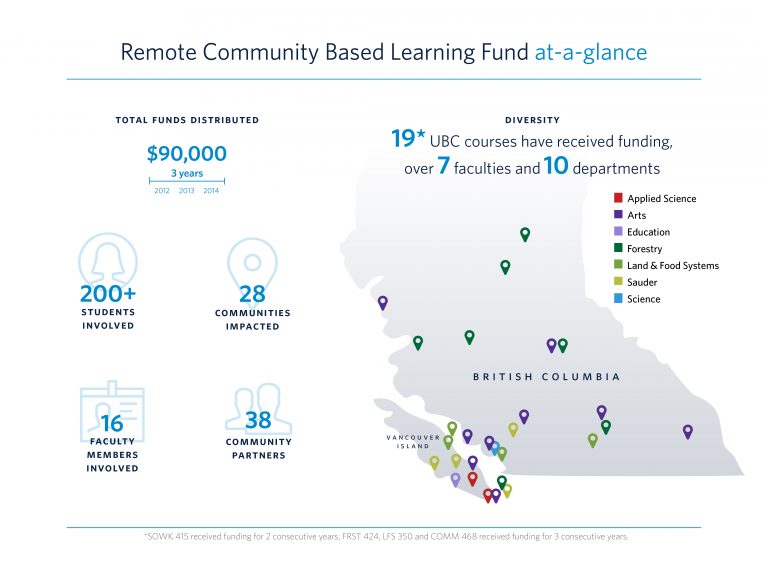Here in the Learning Centre building, there are 28 rooms with names derived from rural communities, and next to each of these is a small historical photograph from UBC Library’s Digital Collection. Together they form a virtual museum that provides students with a connection to the province’s rural places.

Keremeos, 1937 (UBC Library, Rare Books & Special Collections) – displayed next to the Keremeos Lounge in the Learning Centre.
Well-Known IKB Initiatives (We Assume!)
BC History Digitization Program
The longest and probably the best known of its initiatives is the BC History Digitization Program. As shown on the program’s home page, since 2007 the digitization of unique historical material from many rural and northern libraries, archives, museums, and galleries has increased access to British Columbia’s rich trove of historical resources. Over 200 such projects from all parts of the province have been undertaken over the years, all of which have supported the development of local expertise in digitization.
Starting in 2018, access to and preservation of these digitized collections will be further improved as a result of an agreement with the BC Electronic Library Network to migrate digital materials to a central repository that is supported with state-of-the-art preservation protocols. Free, online access to these digitized collections remains an important component of the migration project, and access to content from rural communities remains a priority.
In addition to the BC History Digitization Program, we have undertaken a number of other projects and initiatives in support rural and northern communities.
Small Business Accelerator
During the late Mr. Barber’s public consultations in 14 communities around BC prior to the Centre’s completion, there was strong advocacy for an effort to support small businesses. In 2010 the Learning Centre launched the Small Business Accelerator (SBA), which offers free online access to reliable business information and tools for secondary market research for BC businesses and entrepreneurs. The Learning Centre funds the annual cost for access to the Gale Business Plans Handbook for all public libraries in the province. SBA staff will handle e-mail enquiries from anyone, and rural communities can locate resources in their town or region by searching the BC Business Support Directory.

BC Business Support Directory search page (Courtesy of UBC Library, Irving K. Barber Learning Centre).
Indigitization
Working closely with Indigenous communities around the province since 2013, the Learning Centre, along with key partners, has supported First Nations organizations to rediscover missing or lost heritage through the digitization and analysis of audio recordings dating back to the late 1960s. The overwhelming majority of the program’s 34 projects have been located in BC’s rural and northern communities.
This program has attracted interest from around the world, with requests for more information coming from the USA, New Zealand, and South America. Importantly though, we defer to the voices of our community partners as they share the experiences and expertise that have arisen from local projects. Their presentations were featured at the 2016 Indigitization Futures Forum, and their expertise has contributed to significant improvements in an open-source online toolkit that communities around the world can adapt and use in ways that support local priorities. In this way the Learning Centre provides a channel for Indigenous communities around the province to share their knowledge with a global audience.

Indigitization Training Cohort, 2015 (Courtesy UBC Library, Irving K. Barber Learning Centre).
Lesser-Known Initiatives (We Think!)
Rural Capacity-Building and Education
Community engagement and staying true to the model for community-led libraries is a “long game” and at times it is a difficult path to walk, especially given the established traditions inside of academic libraries. For us, that is where our connections to rural and northern communities are extremely beneficial. We are grounded and guided by the voices and experiences of residents in rural areas. Our connections are often channeled through and supported by existing networks. It’s vitally important for us to remain flexible and adaptive to the changing circumstances in communities and to the dynamics of these networks.
Since 2013 the Learning Centre has been part of the LIRN BC collaboration, a set of agencies focused on providing learning opportunities and capacity building in rural and northern BC communities. In 2018, this group will be revising its method for learning about local issues and priorities, and adapting its style of collaboration to better match the goals of rural and northern non-profit and educational agencies.
For five years the Learning Centre has been an active partner with the Aboriginal Enhancement Schools Network, made up of teachers in the K-12 grades who are focused on supporting Indigenous students in their transition to further education. These teachers integrate aboriginal ways of learning into the classroom and include all students using a proven method of inquiry and innovation. A report on the impact of this work will be ready in 2018.
Experiential learning by UBC students and faculty in rural and northern communities is another key initiative of the Learning Centre. The Remote Community Based Learning Fund (which will soon be renamed, to remove the pejorative descriptor “remote”) gives faculty and students the opportunity to learn outside of the classroom in collaboration with partners in BC’s rural areas. For example, we heard directly from students in the School of Community and Regional Planning after they worked with non-profit agencies in different areas of the province. In a short video they highlighted the benefits of working directly and collaboratively with these agencies.

Infographic for Community Based Learning Fund, 2016 (Courtesy of UBC Library, Irving K. Barber Learning Centre).
Recently and Looking Ahead: Sponsorships and Open Education
Over the past year the Learning Centre has undertaken efforts to deepen our connection to BC’s rural communities. We have had a voice on the Board of the BC Rural Network and participated in the September 2017 conference, in Nelson, of the Canadian Rural Revitalization Foundation.
We funded travel for representatives from six rural public libraries to attend the April 2017 BC Library Association conference in Vancouver. For the June 2017 Beyond Hope Conference in Prince George we sponsored the keynote address by Ivan Coyote and the conference’s dinner with its “Game of Tomes” theme. In addition, at Beyond Hope we supported a presentation by Farhad Dastur, an instructor and Open Education Research Group Fellow at Kwantlen Polytechnic University. Naturally, his session focused on open education resources.
Professor Dastur’s presentation was timely, since open education and open access are emerging as higher priorities for the Learning Centre as it enters its second decade. As network connectivity improves in rural areas, and with economic pressures causing many to re-think lives in big cities, having equitable access to educational, informational and cultural resources are important factors in any decisions to remain, relocate, or return to rural areas.
Mr. Barber left us a clearly written statement of purpose and charter of principles that refers inclusively to all residents of British Columbia. It calls on us to “provide the opportunity for future generations to be at the forefront of learning.” That enduring request along with our strongly held understanding that knowledge is decentralized and is held as much outside of universities as it is inside, means that our connections to rural communities in the province will remain strong.
>Gordon Yusko is the Assistant Director for Community Engagement at UBC’s Irving K. Barber Learning Centre.
Project Coordinator, BCLA

